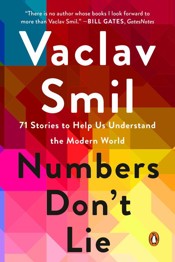Numbers Don’t Lie: 71 Stories to Help Us Understand the Modern World

Vaclav Smil is a scientist and policy analyst. His specialty is looking at societal problems and figuring out how science and policy should intersect to make it better.
He taught environmental science at the University of Manitoba. Bill Gates has said several times that Smil is one of his favorite writers.
This book is a bunch of short chapters (71, as the subtitle says) where Smil just talks about…things he finds interesting? Most of them have something to do with industrial demographics or statistics – how the world works according to the numbers.
Examples:
He calculates how many man hours it took to build the pyramids by calculating their weight and the distance the rocks had to travel, figuring out how many calories it would take to move them, and the average calories a man can generate in a day
He discusses how efficient chicken are at processing calories – turning feed into meat (their own), and why this means we eat more chicken than any other meat
He relays the history of trans-Atlantic crossings, from the first boat to the Concorde, and explains the diminishing returns of making the trip faster and faster
Outside of his “numbers and industry” theme, a lot of the book seems random. But that’s okay – he’s an engaging writer, and I was never bored.
He’s like Malcolm Gladwell or Michael Lewis – sometimes you think, “What does this have to do with anything?”…but you’re having fun, so you keep turning pages. When the book is done, you enjoyed it, but you can’t quite figure out why.
I read his earlier book How the World Really Works: The Science Behind How We Got Here and Where We’re Going, and that was much more of a narrative. This book is just a bunch of little vignettes, but I didn’t hate it. I’m glad I read it.
Book Info
- I have read this book. According to my records, I completed it on .
- A softcover copy of this book is currently in my home library.